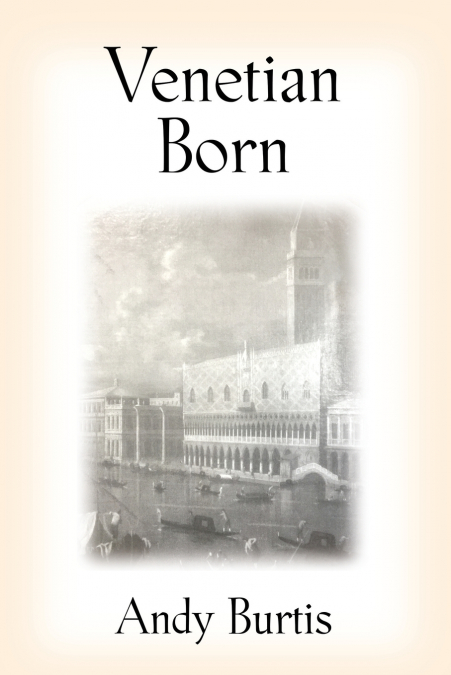
Andy Burtis
‘Venetian Born’ is a story about friendship—an unlikely friendship between two very different boys with very similar names; Piero Caesar Alberti, raised on a Lido farm before being moved to a backwater port town to work at an inn, and Giulio Caesar Alberti, born into the second highest class of Venezia and in training at the Ducal Palace to be a Secretary-Ambassador if not Secretary to the Ten like his father. These were real characters, in the flesh, ones who did exist in that exact time, and lived, studied, or worked in those exact places the author, Andy Burtis, describes: He knows, for he has stayed in the same inn at Malamocco that Piero worked in before sailing off to Holland and America in his second and third books of the trilogy of these characters’ Bildungsroman.His researchers, one a Ph.D in Venetian History from Princeton, the other from Padova who specializes in the Alberti families of Venice, have brought life from the archives like sculptors working on solid stone. On his part, he stayed enough ahead of them to lead their research, mostly with what he found in Alan Hinds voluminous ‘Calendar of State Papers’ related to Venetian Affairs, where he found mention of Giulio’s family situation at the time of Giulio’s father’s imprisonment. Imagine his excitement at hearing from his researchers that they found what he was hoping for from what he had learned about the character of Giulio’s father—that Andrea Alberti was framed by the same witnesses as a famous noble of the time. Giulio's father was exonerated of treason just after the famous ambassador, the Cavaliere Antonio Foscarini, in 1623. Truth indeed, can not only embellish, but actually trump fiction. And it can be something to look forward to.Now add to this the charm of Venice itself where all this plays out, which can never be just a background but cries out like the stones, like this novel's children, to be seen and heard, and appreciated: The Grand Canal as negotiated by Giulio’s family gondolier, Romano, The Ducal Palace with all its secret chambers and gilded halls and staircases, salons great as the Consiglio Maggiore Giulio attends and as small as that where Fiamo gives his testimony at the trial of the Doge Mocenigo's son for murdering Cecco's only daughter who was picking berries to take him. Laugh at the farcical attempt of Giulio to take notes of all that was deliberated at the Senate as part of his secretarial training.Indeed, intrigue veritably oozes out of walls studded with the lion’s heads that hear every word. Imagine the sunrise on the lagoon that Piero would see on his way to work in his Uncle Giobbo's produce boat. Imagine the immense Arsenale from the vantage point of a nine-year-old Piero who has decided to become the ships carpenter and caulker. Picture the Rialto where Giobbo drops off the Lido's produce before going up to the Basilica San Marco's rafters to hear the great Monteverdi conduct his practice sessions and aping those melodies on his violin.Thumb through the pages to find pictures of the palazzi of Venice like the medieval castle converted into the Fondaco dei Turchi where Giulio does the books for his nefarious uncle to learn the Eastern Trade, and meets the wild-eyed Turkish boy dubbed ‘Ji’ for the Jihadi he always talks about back home in his ‘Islambol.’ And of course, there are always the dungeons where the members of each boy’s family wind up, and where Piero runs messages to and from those waiting so anxiously to hear some news, any news…. Finally, discover the value of Venice to the world, its character so often marginalized to stories of romance and masquerade. Learn what made it not just an oligarchy but a republic strong enough to inspire countries like England, Holland, France, even America with its freedoms, longevity, and industry.